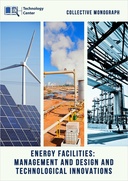Explore

Energy facilities: management and design and technological innovations
Andriy Polishchuk, Volodymyr Kulyk, Vira Teptya, Sviatoslav Vishnevskyi, Yurii Hrytsiuk, Iryna Hrytsiuk, Viacheslav Komar, Petro Lezhniuk, Vladyslav Lesko, Juliya Malogulko, Volodymyr Netrebskyi, Olena Sikorska, Volodymyr Khomenko, Oksana Chernysh, Viacheslav Barsukov, Viktor Tverdokhlib, Arkadij Berezovskij, Volodymyr Slobodianyk, Natalia Minska, Roman Shevchenko, Vasyl Servatyuk, Valery Strelets, Victoria Lukashenko, Yaroslav Kalchenko, Ernst Kussul, Tetyana Baydyk, Masuma Mammadovа, Jorge Luis Rodriguez Mendoza
2022
0 Ungluers have
Faved this Work
Login to Fave
The collective monograph contains the results of scientific research on the management of energy facilities and the creation of elements of energy systems. A feature of the proposed approaches is the consideration of objects in several aspects: process control in distributed networks, the balance of production and consumption of electricity, innovative materials and technological solutions focused on the concept of using renewable and non-traditional energy sources.
Chapter 1 presents a solution to the problem of improving the methods and tools for optimizing reactive power flows in distribution networks with significant daily volatility in generation and consumption of electricity.
Chapter 2 proposes an algorithm for the method of matching the generation schedules of photovoltaic power plants with the electric load of the network as a possible solution for improving the balance in the electricity grid with renewable energy sources.
Chapter 3 describes the results of research and development of environmentally friendly methods for producing composite materials for electrochemical capacitors related to non-traditional rechargeable electric current sources.
Chapter 4 presents the results of a study of solar cells based on CdS/CdTe, intended for backup power supply of security systems and facility management in conditions of damage to the power supply system. Ways to improve the efficiency of such film solar cells are proposed.
Chapter 5 presents the development of several prototypes of compact, lightweight, and inexpensive solar concentrators, and proposes two assembly methods that overcome the main problem associated with automating the solar concentrator assembly process.
The monograph is intended for practitioners in the field of creating energy systems and managing power supply facilities, engineering and technical specialists, and designers. The monograph will also be useful for researchers and university teachers who use advanced research developments in the educational process in the relevant specialties, developing the skills of working with scientific information in future young professionals to generate new practical solutions.
This book is included in DOAB.
Why read this book? Have your say.
You must be logged in to comment.
Editions

